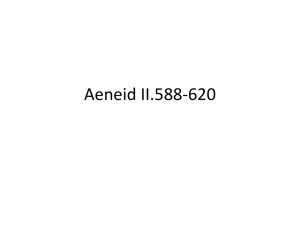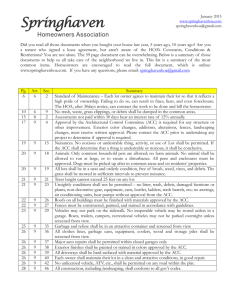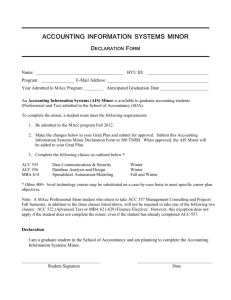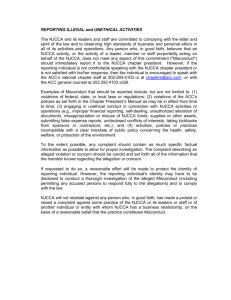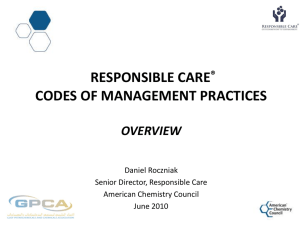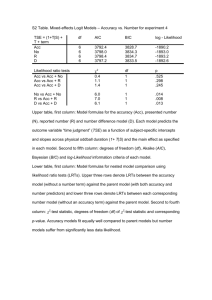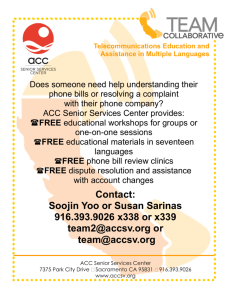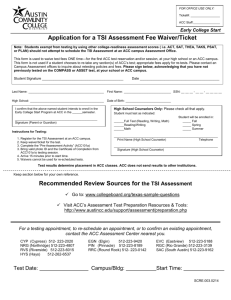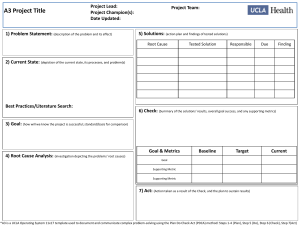01-gpca_rc_workshop_acc_rc_evolution120912
advertisement
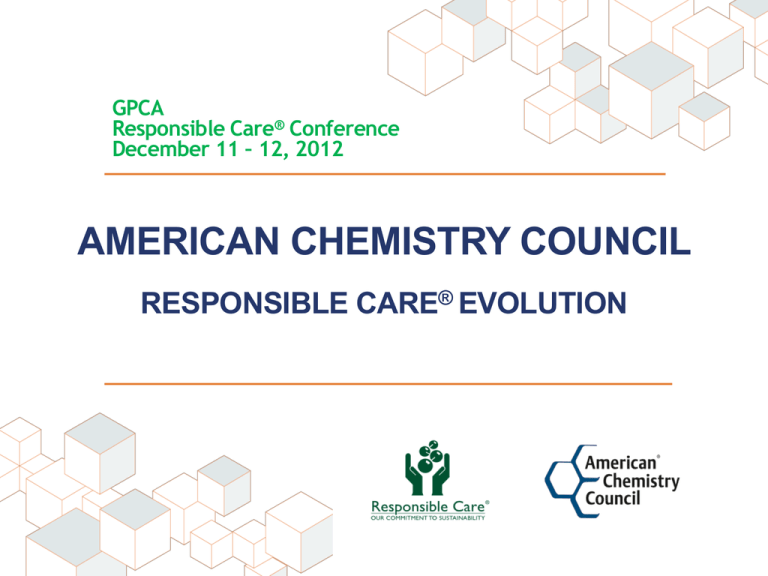
GPCA Responsible Care® Conference December 11 – 12, 2012 AMERICAN CHEMISTRY COUNCIL RESPONSIBLE CARE® EVOLUTION Responsible Care® A commitment to: • Improve EHS&S performance & chemical management • Use resources efficiently • Engage stakeholders • Report openly & transparently • Establish best-in-class community that shares ethical & operational philosophies & links suppliers and customers Responsible Care® in the US Key Features Responsible Care implementation is an obligation of membership. All must participate. Single approach for small, medium and large companies. Consensus building process ensures broad support. Robust mutual assistance processes. CEO involvement and oversight. 3 ACC Responsible Care® Requirements • Sign Guiding Principles • Conform to Responsible Care Management System® • Third-Party Certification • Performance Reporting • Responsible Care Security Code® Responsible Care® Partners Non- chemical manufacturers participating in ACC members’ supply chains: • Truck Carriers • Equipment Suppliers • Railroads • Warehouses • 3PL’s • Marine • Terminals • Services Must meet all ACC Responsible Care requirements. Extends Responsible Care’s brand. Strengthened EHSS relationships. Responsible Care® Track Record: Responding to Pressures and Opportunities Responsible Care® Responsible Care® 2.0 Responsible Care® 3.0 Responsible Care® 3.5 Responsible Care® 4.0 Responsible Care® 1.0 Originates US Program in launch: Codes Canada Peer review element introduced Third-party certification & Security Code Industry-wide performance targets established Defining the future: New Product and Process Safety Codes; added focus on waste/reuse/recycling Key Elements – ’88 to ‘93 Development of Original Six Codes of Management Practices CAER, Employee Health and Safety, Pollution Prevention Process Safety, Distribution, Product Stewardship Development of Guidance Materials and Education Implementation of “Practice in Place” Methodology A Few Metrics Related to Codes in Place Minimal Data Transparency Key Elements – ’93 to ‘03 Focus on Implementation – Move towards “Practice in Place” Metrics Gradually Increase in Transparency Trade Association Aggregate Company to Company Comparison Public Availability Management Systems Verification (Management Practices Focused) Annual Responsible Care Conference Geographically Based Leadership and Practitioner Networks Key Elements – ’03 – ‘13 Management Systems Design (Two Technical Specification Options) Responsible Care Management System (RCMS®) RC14001® Third Party Audits of the Management System Security Code Development Enhanced Set of Metrics Association Wide Goals Set for Selected Metrics Working with Stakeholders to Recognize Value of Responsible Care Strategic Success Factors Member Company Leadership via Responsible Care Committee Executive Level Governance Process Investing in Education / Development of Coordinators Developing Support Networks Sharing Best / Good Practices Involvement of Stakeholders Focus on Communications – Internal and External Technical Training, Workshop and Support Activities Enhance Performance Measurement Bolster Process Safety Goal: Connect Performance and Advocacy Align Energy Efficiency Adopt Product Safety Code Member-Driven Strategic Review Process Responsible Care® Strategic Review: Inclusive and Forward-looking Evolution of Chemical Issues Consumer Activism Marketplace Deselection Local Bans State Regulation Federal Regulation Product Safety Code Operationalizes TSCA modernization principles; serves as cornerstone for ACC’s top advocacy priority Enables prioritization, communication and demonstration of product safety & stewardship throughout value chain Complements ICCA Global Product Strategy & aligns with new OSHA Hazard Communication standard Process Safety Code and Reporting Process Safety Code and Reporting Strengthens core concepts such as leadership, accountability, and culture Complements regulatory requirements, e.g., OSHA PSM standard and EPA Risk Management Program Designed for flexible implementation commensurate with risk ACC process safety metric to be aligned with API RP754 when update is completed (2015-2016) Implementation verified during certification audits between 2014 and 2016 Global Responsible Care 2012 ICCA Responsible Care Status Report • Shows progress over last 5 years • Made available at Rio+20 and ICCM-3 Global Responsible Care Family Association’s Progress on Key Responsible Care Elements Exceeding In Good Non-Reporters Milestones Standing (2011) X # associations in good standing Lagging Behind Persistent Nonreporters 1 Arabian Gulf 9 Greece, Hong Kong, Hungary, India, Israel, Morocco, Peru, Turkey, Venezuela 3 41 1 Denmark Responsible Care® Global Charter 9. Provide Supporting Resources 8. Address Stakeholder Expectations 1. Adopt Global Responsible Care Core Principles 2. Implement Fundamental Features Responsible Care® Global Charter 7. Support National and Global Governance Processes 3. Advance Sustainable Development 4. Improve and Report Performance 6. Extend Responsible Care Across Supply Chain 5. Enhance Product Stewardship The global Responsible Care initiative is “an inspiring model of voluntary self-regulation for other industries to consider following.” Former UN Secretary General Kofi Annan Fundamental Features Establish and implement a set of Guiding Principles that Member Companies sign Adopt a title and logo that are consistent with Responsible Care Implement management practices through a series of systems, codes, policies or guidance documents to assist companies to achieve better performance Develop a set of performance indicators against which improvements can be measured Communicate with interested parties inside and outside the membership Share best practices through information networks Encourage all association member companies to commit to and participate in Responsible Care Introduce and apply systematic procedures to verify implementation Communications 26 Contact Information Thank You! David Sandidge Director, Responsible Care® American Chemistry Council david_sandidge@americanchemisty.com 423.276.9883 www.americanchemistry.com 27


